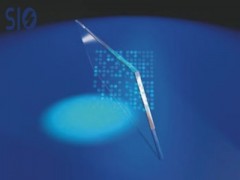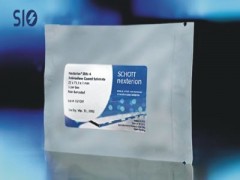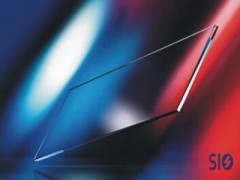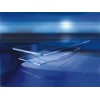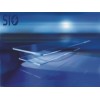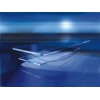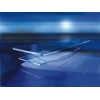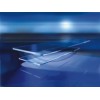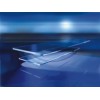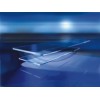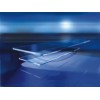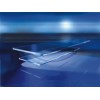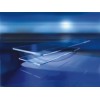品牌:德国肖特生物芯片 SCHOTT
规格:75.6*25.0MM
厚度:1.0mm
起订:25片
供应:1000片
发货:1天内
Aldehydesilane coating 醛硅烷涂层
NEXTERION® Slide AL
NEXTERION® Slide AL offers a good alternative to NEXTERION® Slide E (Epoxysilane slides) when an efficient covalent, and directed binding of amino-modified bio-molecules is required. NEXTERION® Slide AL is coated with an “active” slide chemistry coating that chemically binds bio-molecules to provide a high binding capacity, and minimize non-specific binding. The uniform surface features aldehyde groups that readily react with primary amines. Both 5’ or 3’ amine modified PCR products, and oligonucleotides work well with this surface chemistry. The covalent bond formed at the terminus of the nucleic acid offers both stability, and maximal base pairing opportunity. The covalent binding diminishes sample loss during the course of experiments, and permits more harsh wash steps, which reduce background, and allow for greater sensitivity. Additional immobilization steps, such as baking or UV cross-linking, are not required for immobilization. Furthermore, peptides, proteins (such as antibodies), cells, and tissues can be immobilized on NEXTERION® Slide AL via random binding to amine sites on the probes. The slides are easy to use, and are compatible with all commercially available arraying and scanning instruments.
Overview
|
Type of coating |
Immobilization method |
Typical probes |
Ordering information |
|||
|
NEXTERION®product |
Barcode option |
Item number |
Slides per pack |
|||
|
Aldehydesilane 2-D surface |
Amine reactive chemistry |
Amino-modified PCR products, BACs and oligonucleotides |
Slide AL |
None |
1064874 |
25 |
|
Laser |
1064876 |
25 |
||||
|
Key product features |
|
• Stable and covalent binding of probes such as amino-modified nucleic acids, cells, and peptides |
|
• Optimal accessibility of probes through specific end-point attachment |
|
Typical applications |
|
• Array CGH using whole genome tiling path BAC arrays |
|
• miRNA expression profiling |
|
• Indel oligonucleotide arrays for genotyping |
|
• 16S rRNA-based taxonomic microarray |
|
• Protein-DNA interaction studies |
|
• Protein-protein interaction studies |
|
Suitable probe types |
|
• Amine-PCR products and BACs |
|
• Amino-modified oligonucleotides |
|
• Small protein fragments such as peptides |
|
• Cells and tissues
|
Immobilization chemistry
The DNA product is spotted onto the aldehydesilane slide. The primary amino linkers (NH2) on the DNA attack the aldehyde groups to form covalent bonds (Schiff’s base). The attachment is stabilized by a dehydration reaction. To minimize fluorescent background, unreacted aldehyde groups are reduced to non-reactive primary alcohols by treatment with sodium borohydride. In addition, this step reduces the double bond between the probe and surface, producing an irreversible covalent immobilization. Additional steps for immobilization, such as baking, or UV cross-linking, are not required.
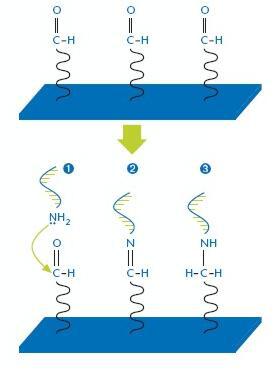
Product details
Highly reproducible coating
NEXTERION® Slide AL are produced using an innovative process developed by SCHOTT to produce a consistent and reproducible coating. All slides are individually examined for physical defects and the presence of particles before and after coating. The density of the aldehyde groups on the coating remain constant over the entire surface of the slides, and has been optimized to provide the optimal binding capacity. The surface hydrophobicity is tightly controlled to optimize the performance with both contact and non-contact printers.
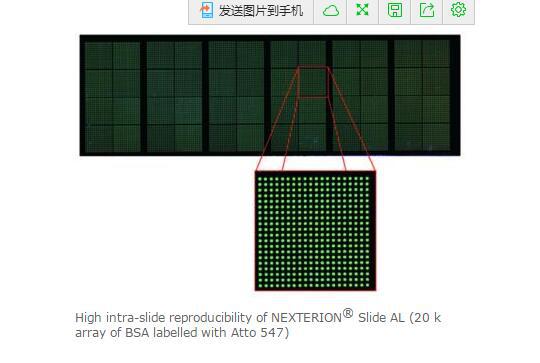
Packaging and storage
NEXTERION® Slide AL are packaged in chemically stable plastic boxes and sealed in an inert atmosphere. The slides are ready-to-use from the box, and are stable for 9 months in the sealed packaging when stored at room temperature.
Format
The slides are available in packs of 25-slides with optional code 128 barcodes enabling automated sample tracking. The aldehydesilane coating is also available in 16-well slide, 48-well slide and 96-well microplate formats.

NEXTERION® Slide AL evaluation Kit

